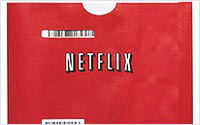 A judge has signed off on a class-action
settlement requiring Netflix to pay $9 million in order to resolve a class-action privacy lawsuit. The deal also requires Netflix to stop linking former subscribers' names with their movie-viewing
history.
A judge has signed off on a class-action
settlement requiring Netflix to pay $9 million in order to resolve a class-action privacy lawsuit. The deal also requires Netflix to stop linking former subscribers' names with their movie-viewing
history.
The settlement, granted final approval this week by U.S. District Court Judge Edward Davila in the Northern District of California, calls for Netflix to pay $6.5 million to a total of
20 nonprofits, and up to $2.25 million to the lawyers who sued the company. Davila said in a written order that he found settlement “fair, adequate and reasonable.”
The deal
resolves allegations that Netflix violated the federal Video Privacy Protection Law by storing information about their rental histories for at least two years -- even when people canceled their
accounts. The consumers who sued argued that Netflix ran afoul of a provision requiring movie rental services to destroy users' personal information within one year of the time the data is no longer
needed.
advertisement
advertisement
Congress enacted the video privacy measure in 1988, after a Washington newspaper obtained and printed the movie rental records of U.S. Supreme Court nominee Robert Bork. The law also
prohibits movie rental services from disclosing information about customers without their written consent.
Earlier this year, an amendment took effect allowing consumers to give consent on an
ongoing basis. That move paved the way for Netflix to integrate with Facebook by sharing users' movie selections with their social networking friends.
The settlement approved this week brings
an end to a lawsuit filed in March of 2011 by Virginia resident Peter Comstock. Netflix
announced more than one year ago that it had reached a resolution of the matter, but
the deal was delayed after it drew objections from around 100 people. Much of the criticism centered on the plan to distribute the settlement fund to nonprofits. Some objectors argued that any
settlement money should go to Netflix consumers, not to public interest organizations. Davila rejected those arguments, ruling this week that it wouldn't be feasible to distribute the fund to
Netflix's subscribers.